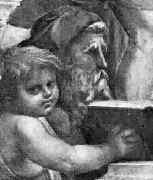Person: Zeno Of Sidon

Zeno of Sidon was a Greek philosopher who became head of the Epicurean school. He criticised some axioms that Euclid set out in The Elements.
Mathematical Profile (Excerpt):
- Sidon was one of the oldest Phoenician cities and, from its founding in the 3rd millennium BC, was ruled by many different peoples: Assyria, Babylonia, Persia, Alexander the Great, the Seleucids of Syria, the Ptolemys of Egypt, and the Romans.
- To understand the philosophy of Zeno we need to make some comments about the philosopher Epicurus who founded the Epicurean School to which Zeno later belonged.
- Epicurus, who lived from 341 BC to 270 BC, founded his own School of philosophy based on his teachings.
- These teachings were designed to indicate a means of living ones life, and they aimed both to guarantee happiness and to provide a means to find it.
- Epicurus had no interest in science for its own sake and he was a severe critic of mathematics.
- His criticisms of mathematics were very superficial of little importance since he clearly had very little understanding of the subject.
- In 306 BC he founded his School in Athens in the garden of his house.
- Apollodorus, the writer of more than 400 books, was a prominent follower of Epicurus who lived in the 2nd century BC.
- Zeno of Sidon was a student of Apollodorus and he studied, and later taught, in the Garden in Athens.
- Zeno was a man of great learning who wrote on a very wide range of topics.
- It is believed that, among the areas he studied, he contributed to logic, atomic theory, biology, ethics, literary style, oratory, poetry, the theory of knowledge, and to mathematics.
- Here we shall discuss the only two areas to which Zeno contributed where details of his contributions are quite well known to us, namely the theory of knowledge and to mathematics.
- Although Epicurus, the founder of the School to which Zeno belonged, had no real mathematical abilities and criticised the subject from a position of ignorance, this is far from true of Zeno who had a deep understanding of the subject.
- Zeno made deep criticisms of the axioms that Euclid set out in The Elements.
- Zeno also attacked Euclid's proof of the equality of right angles on the grounds that it presupposes the existence of a right angle.
- Proclus also says that an Epicurean (almost certainly Zeno but Proclus does not name him) claimed that Euclid assumes that every curve is infinitely divisible, but again this cannot be deduced from the axioms.
- Some modern authors have suggested that these claims give Zeno of Sidon some justification to be considered as having been the first person to consider the possibility of non-Euclidean geometry.
- This is a little far fetched particularly since Zeno's aim was certainly not this.
- Rather his aim was to give substantial arguments against mathematics supporting the anti-mathematical beliefs of Epicurus.
- Mathematicians of course, came to the defence of their subject, rather than to try to understand the deep and justified comments of Zeno.
- Many people gain an important position in history, or fail to gain such a position, as a result of luck.
- Had there been a mathematician following Zeno who could have continued to develop his ideas then we might know Zeno today as a major figure whose flash of mathematical genius changed the course of mathematics.
- This was not to be, however, and the brilliance of Zeno's ideas were not appreciated for many centuries.
- We know more of Zeno through one of his students Philodemus of Gadara.
- Philodemus studied under Zeno in Athens and then moved to Rome in 75 BC to work for the Roman aristocrat Lucius Calpurnius Piso.
- Philodemus then went to live in Lucius's villa at Herculaneum, near Naples, taking with him his considerable library of papyri.
- Herculaneum was buried by a compact mass of material about 16 metres deep which preserved the city until excavations began in the 18th century.
- Special conditions of humidity of the ground conserved wood, cloth, food, and in particular Philodemus's papyri.
- The papyri contain remarkable information written by Philodemus describing the arguments of his teacher Zeno with the Stoics.
- Although Zeno's Epicurean philosophy of the desire for pleasure seems the direct opposite of the Stoic's ethic of duty, the consequences on how they lived their lives were quite similar.
- The arguments described by Philodemus concerned the foundations of knowledge.
- that is essentially an anticipation of John Stuart Mill's theory of induction.
- Zeno insisted that all knowledge is fundamentally derived by inference to all cases from a great many cases without observed counter-instance.
- Of course there are many examples in mathematics where Zeno's observations of many cases would actually suggest a false result.
Born about 150 BC, Sidon (now Saida in Lebanon). Died about 70 BC, Athens, Greece.
View full biography at MacTutor
Tags relevant for this person:
Ancient Greek, Origin Lebanon
Mentioned in:
Epochs: 1
Thank you to the contributors under CC BY-SA 4.0! 

- Github:
-

- non-Github:
- @J-J-O'Connor
- @E-F-Robertson
References
Adapted from other CC BY-SA 4.0 Sources:
- O’Connor, John J; Robertson, Edmund F: MacTutor History of Mathematics Archive
